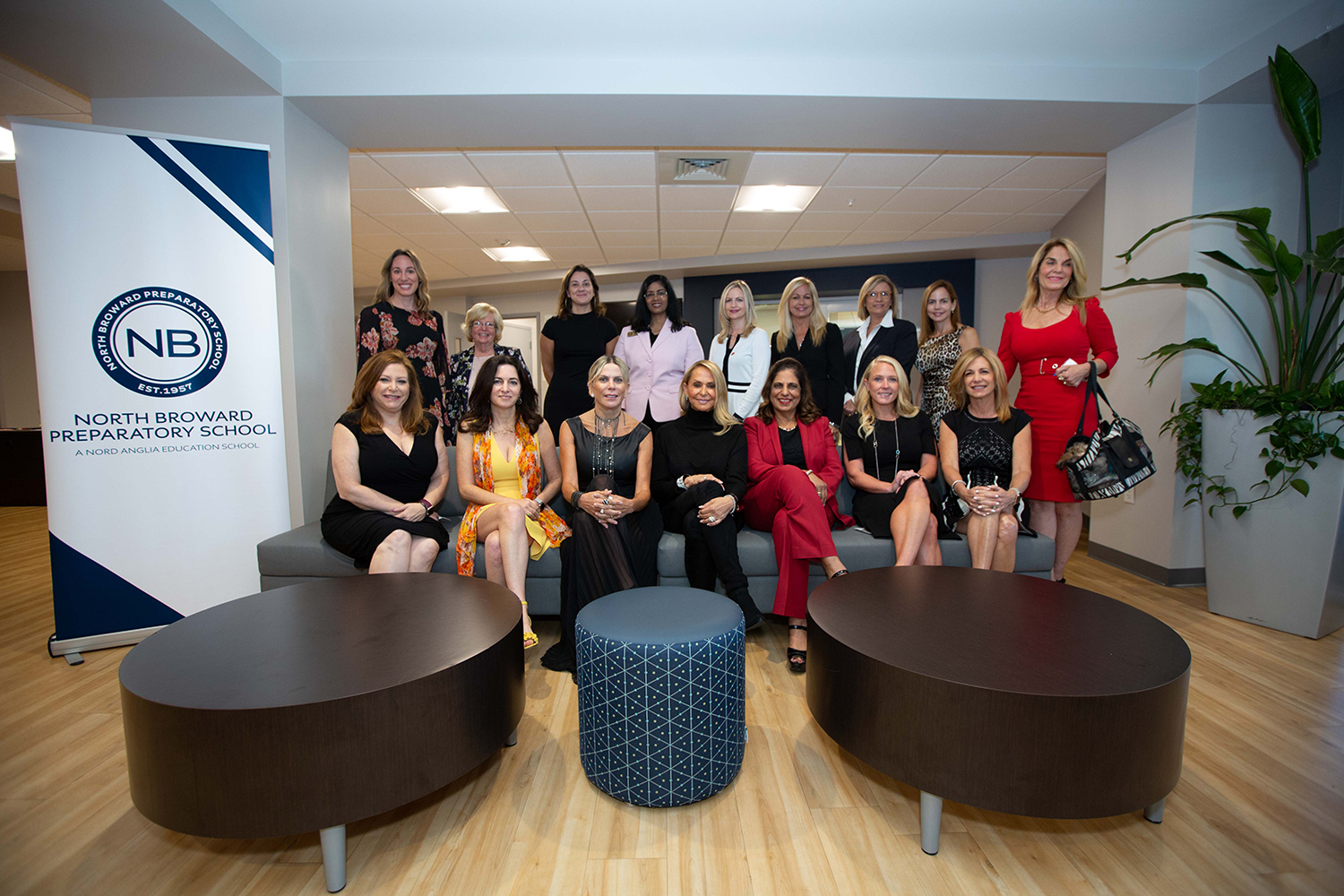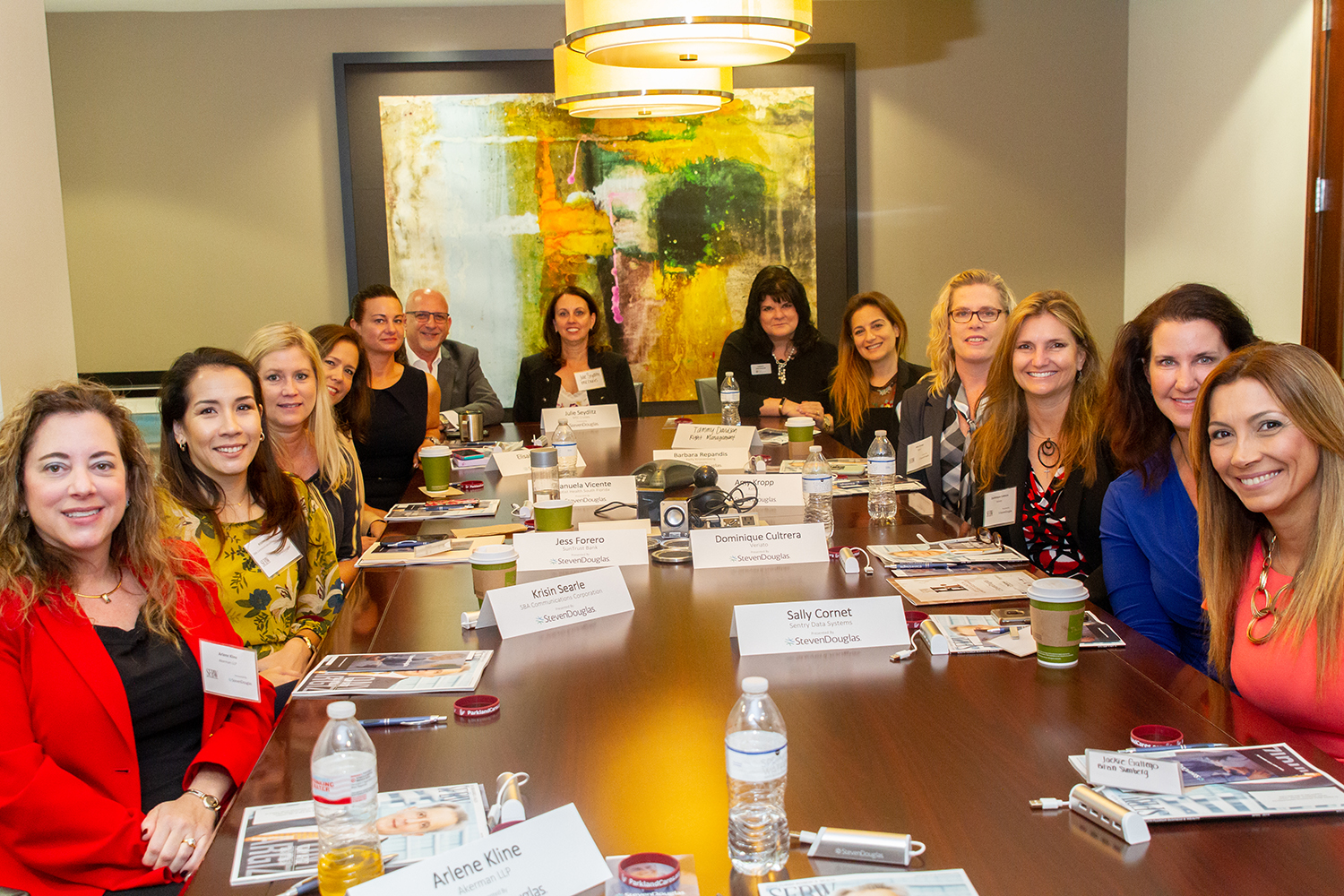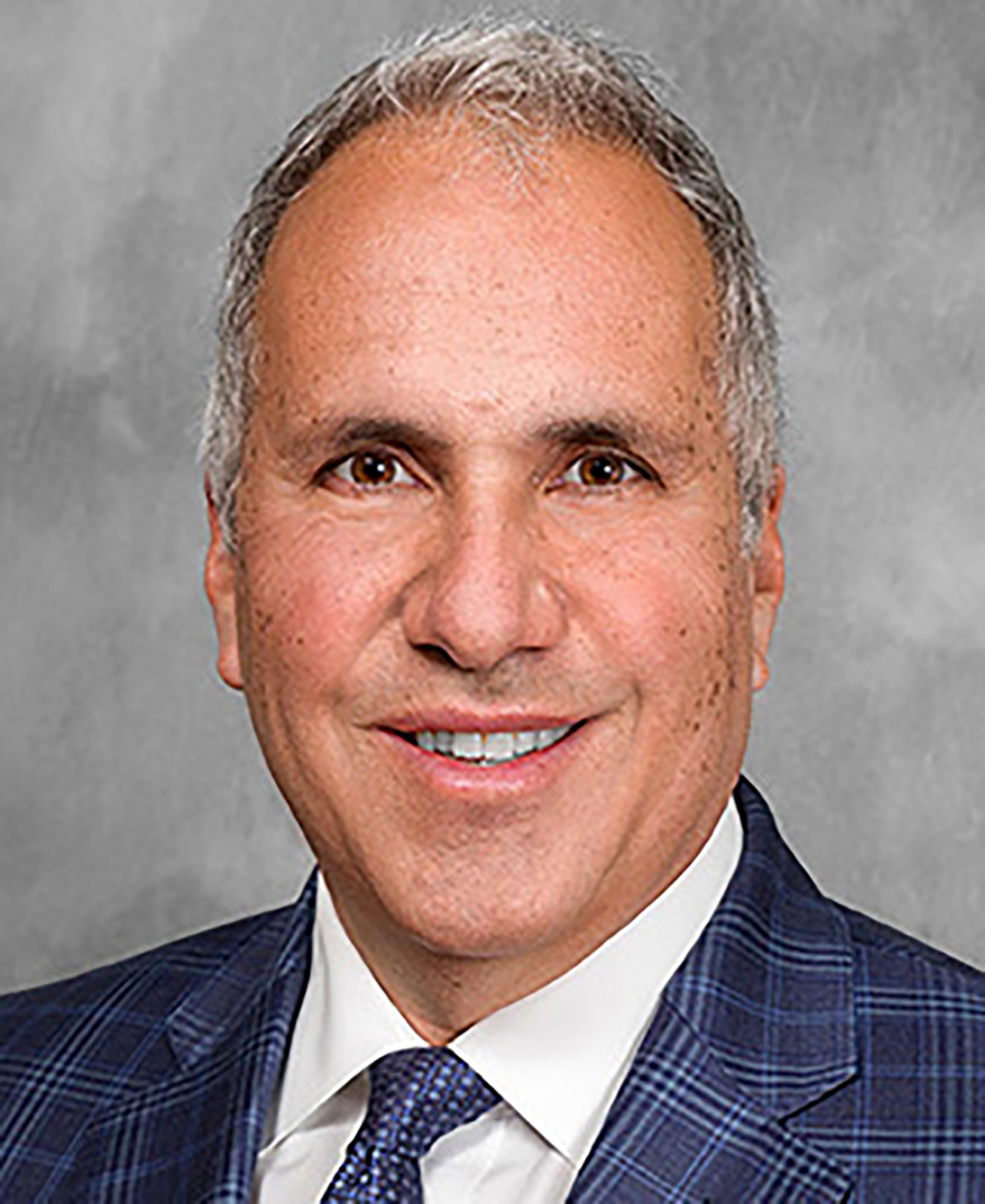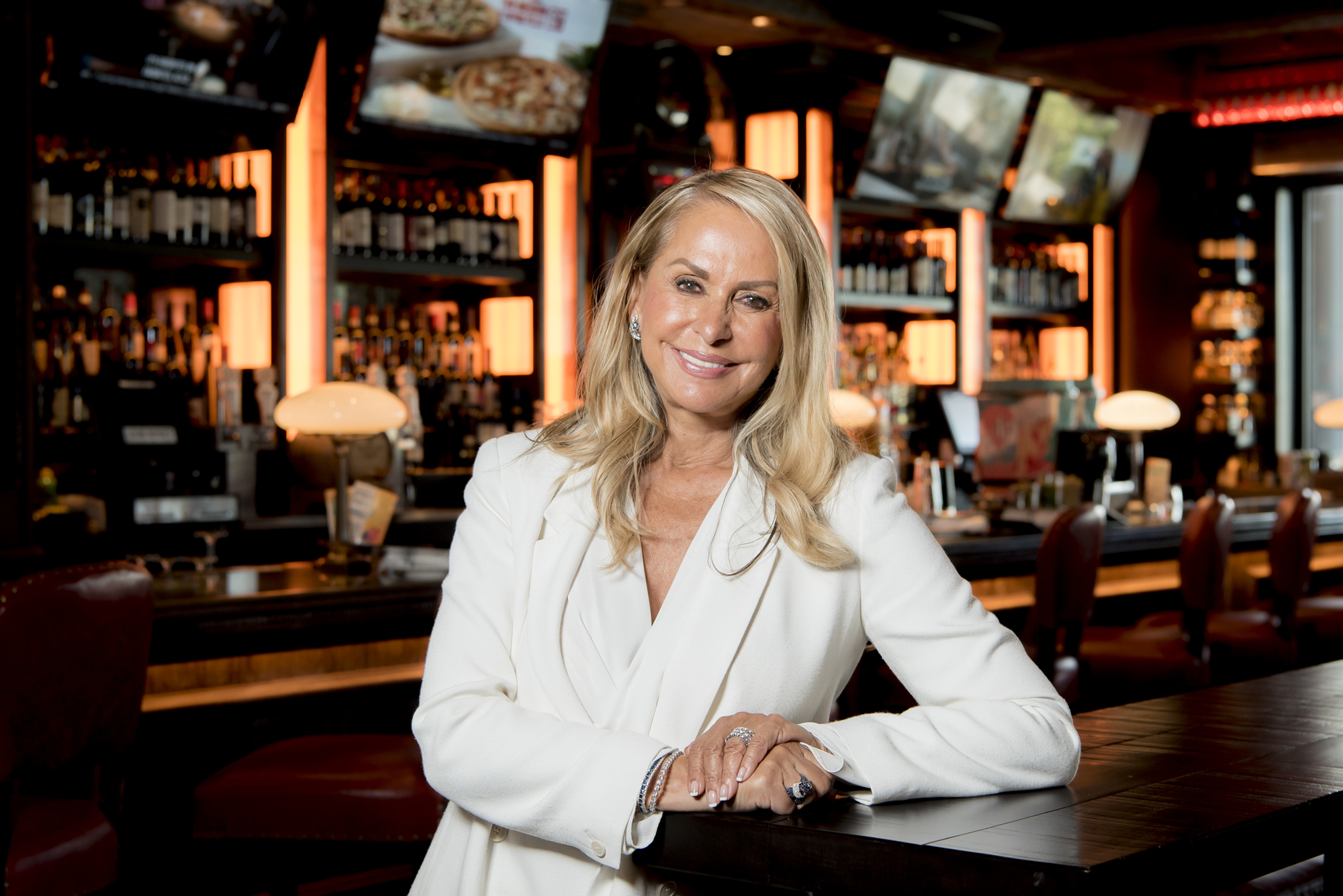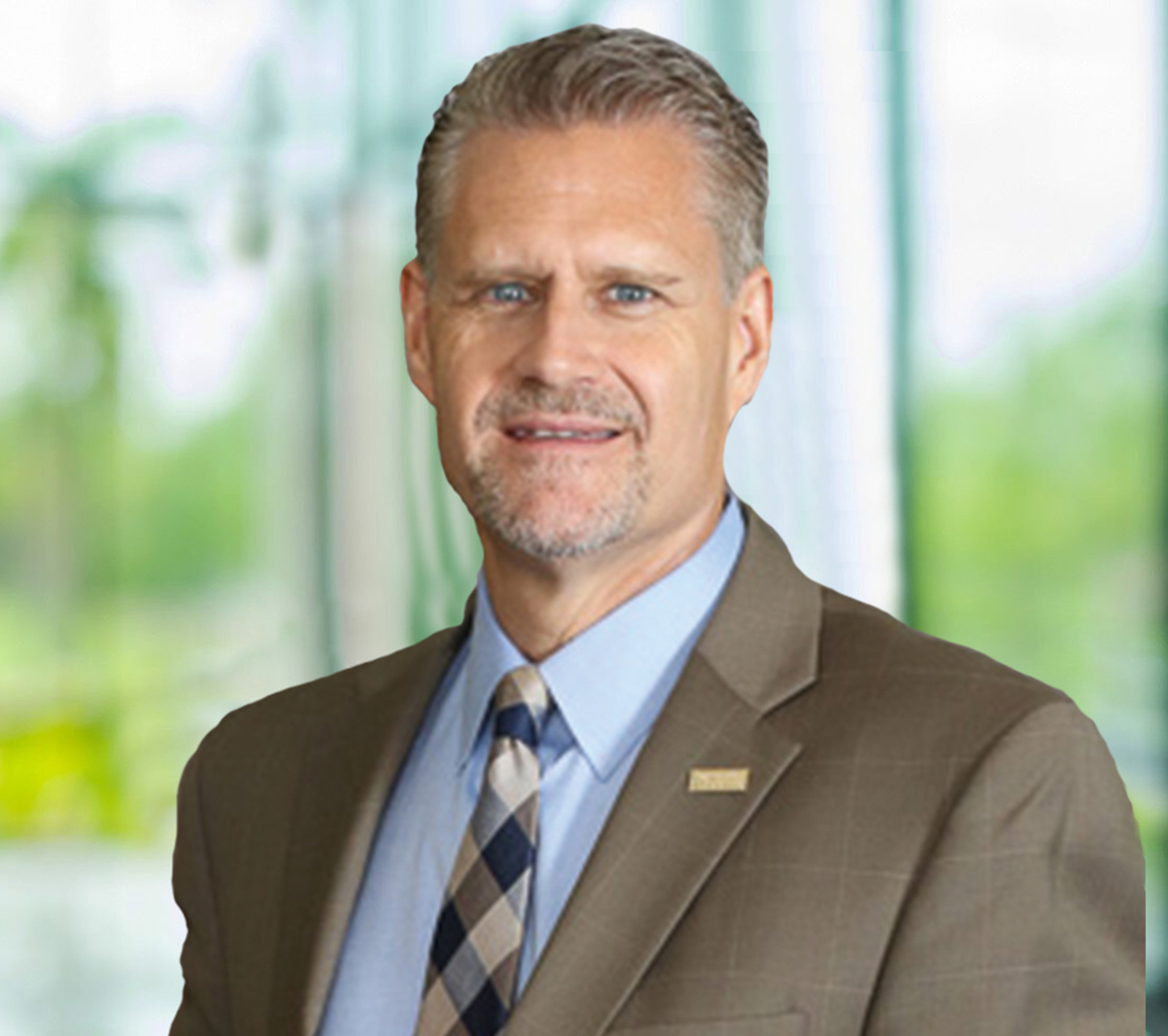[vc_row css_animation=”” row_type=”row” use_row_as_full_screen_section=”no” type=”full_width” angled_section=”no” text_align=”left” background_image_as_pattern=”without_pattern”][vc_column width=”2/3″][vc_column_text]
SFBW assembled a panel of top women business leaders in South Florida for a rousing discussion of issues. Topics ranged from the advantages and disadvantages of being a woman in leadership roles to just how far society has changed and what can be done to spur further change.
The session at North Broward Preparatory School was moderated by SFBW Editor-in-Chief Kevin Gale. The following discussion has been edited for brevity, clarity and continuity.
How is South Florida performing when it comes to women in leadership roles and being on a positive career track, versus some of the other areas of the country?
Beverly Raphael, RCC Associates: I think this room speaks for itself. We have an amazing collection of women in very high positions. We’re not talking about small businesses. We are talking about big businesses. I think the door is open. We’ve walked through it, and we’re breaking new ground.
Rachel Sapoznik, Sapoznik Insurance: I agree with you. However, the one area where I think we are absolutely lagging, is sitting on public boards. We all belong to nonprofits, and that’s pretty easy to get onto. But when you start talking about being on a bank board, which I sit on a bank board, I’m one of only two women that sit on the board. When the other woman’s not there, it’s me and about 16 other men. I think that board positions really need to open up. We need to ask to be on the boards.
Ramola Motwani, Merrimac Ventures: Twenty-five years ago was my husband’s passing. What I experienced 25 years ago was different. I had to go to 26 banks. How many women will try that far? I made it and I am here today. Over the course of time, we create positive change. We still have work to do.
Arminda “Mindy” Figueroa, president and founder of Latin2Latin Marketing + Communication: As a Latina having lived in New York 28 years and in Fort Lauderdale 14 years, I have sensed the welcoming feeling from the trade organizations and chamber of commerce. I’m the first Latina Puerto Rican LGBT [person] to be on the board of the Tower Club. I agree with Ramola in terms of the lenders. It wasn’t easy to have a decent line of credit. I was able to experience the opening of doors; I’ve been asked to be part of investment groups that I never had access to before and doing amazing, amazing projects that are going to have an impact on saving lives in the health care space and so forth. When I talk to the gentlemen that are inviting me to the table, they’re very keen about what we bring as women and minorities
Caitlin Stella, Joe DiMaggio Children’s Hospital: Having been in [Los Angeles] for 20 years and having that comparison after being here for just a year, I think everyone’s points are well taken. We definitely have room to grow. I do think there’s something we’re doing better than a lot of places, and that is visibility. I see more and more women being highlighted. The other thing is something Beverly said to me when I got here: We need to stick together, because I think it is sort of a safety-in-numbers thing that, if we are working together, supporting each other and going to the gala and doing the tour, going to Habitat for Humanity, we’re doing that for each other. We’re going to build that strength and we’re going to bring people in. I think we can do that here. In LA, we couldn’t pull that off. We could barely get attention.
Maureen Shea, Right Management Florida/Caribbean, a Manpower Group company: Two or three years ago, Manpower did a global study and interviewed individuals that were at the C-level, millennials and the Gen Xers together. Interestingly enough, globally, the sentiment was that it would take 17 years for women and men to actually reach parity at all levels. So, we really need to stick together and really carry it forward. But it’s also something that has to start from the top. And that’s what our research indicated, that it really needs to begin with the CEOs and permeate down—that we really need to bring women forward because we are making great headway. But if you look at how many CEOs there are compared to male CEOs, it’s a very small percentage, 5%. This is why I’m so involved in women groups, and I’m just chairing for the second year the Women’s Executive Circle from the federation [the Jewish Federation of Broward County], to help other women collaborate and move and to discuss what works, what doesn’t work. We help each other. I think it’s very, very important to bring women into these groups.
Jessica Pavlik, Berger Singerman: Law firms are typically a very male-dominated business. I’ve been there for 14 years. Women in leadership, particularly this type of industry, just wasn’t the norm. But with a lot of perseverance, I’m still there. I’ve been their CFO and now our COO. So, I’ve been in a C-level position now for about almost 10 years. It’s not easy. Now, in my position, I take the opportunity of seeing young women, as lawyers or some other role in our firm. They come to me for advice, and I love that. I give them the advice that they seek to help them get to the next level in this industry.
Raphael: I became CEO when my husband passed away. He had a small, general contracting firm. As soon as lenders heard he was sick, I had to guarantee whatever. I had to have a line of credit and I don’t think they would have done it so quickly with a man. But I made the decision to keep the company and build the company. I also made a decision that there were going to be women that would have an opportunity in the world of construction. As a result of that, almost every single department head in our construction company is a woman—our COO, our controller, our director of project management, our head of estimating. Those are all the key roles in the construction company. The only place that we haven’t really been successful has been in the field. That will change, too. My vice president of operations, who is my younger daughter, she runs the field. So, the guys have gotten used to and actually really like it better than when they had anybody else that was directing them there.
I’ve heard of women business leaders being mistaken for support staff when they come to a meeting and asked to fetch a cup of coffee. Does this still happen a lot? We’re also a melting pot in South Florida where different cultures may have different attitudes.
Sheri Fiske Schultz, Fiske & Co.: I remember back when I started at a Big Eight accounting firm. It was administration day, and so we took the administrative staff upstairs to the Tower Club. When we walked in, there were two women, a partner and myself. They handed us the flowers and said, “Happy Secretary’s Day.” I looked at it. I didn’t want to be rude. But knowing me, I definitely said something. But I don’t see that today.
Sapoznik: I started my career with John Hancock, and it was pretty male-dominated. Basically, it’s still pretty much male-dominated. But I think the fact that women now are starting to take leadership position, so we have 60 employees today and 10 of them are men and 50 are women. This is going to be my 33rd year. Over those 33 years, the babies that have been born, the marriages that have been broken or added, the breast cancers, the different types of life events that have occurred, have really been able to expand my horizons as to how important it is to have women in leadership. It’s so important, because we do have that sensitivity. We do have that understanding that women many times are not only taking care of themselves, they’re taking care of a parent, they’re taking care of their children and they’re the last ones on the totem pole. We can be that inspiration for them, we could help them, give them that chance. I think also from a mentoring standpoint, I’m very concerned about how the younger women are feeling. A lot of times, younger women feel they need to make a choice of career versus family. I don’t think you need to make that choice. Men don’t make that choice. We need to inspire women that if they choose to get married, or they choose to have children it’s not an either or.
Schultz: I do a lot of divorce work. I meet with a lot of women who were out of the market and they took care of their children and that’s all they know. One day, now, all they’re doing is waiting for an alimony check. Then the alimony stops because the ex-husband decides he has someone else. He can’t afford it. They don’t have any resources or the ability to take care of themselves. You have to have a career. It’s so important for us to explain and to tell other woman we can all do both and be successful at both family and work.
I wanted to add something about research that we did this year with Athena International, a network of executive women. A lot of things have changed to the positive, but there’s still a lot of stigma among ethnic communities in the workplace, especially, if you talk with your hands, if you touch too much when I’m talking to you, if I might go to the pantry and my food that I have in the oven smells in a different way, if I am too loud, or I use very colorful type of attire, so there’s still stigmas we have to be aware of. At the same time, they’re trying to leave the corporate world. We saw women at the roundtable, I guess we call it the “Listen to Learn” tours, where they were literally sobbing from the anger and the hurt that they have felt in corporate America. Actually, some of them are being driven out of corporate America. That’s why you see a large number of Latinas are starting their own businesses. And it’s similar to the African American counterparts in many ways.
Christine Barney, RBB Communications: I think to me the key difference in terms of how I’ve seen the evolution comes from when we were Rubin, Barney & Berger, and I used to go to meetings, and people would say, “Are you related to Barney?”—assuming I was the daughter as my two partners were older gentlemen. There was a meeting just recently, where we were sitting at a table with a bunch of men, and one of the men said, “Would you give us a minute?” My male partner said, “What is there that she can’t hear and he said, “I’m just going to tell you a dirty joke.” Making sure that you build a culture where your male partners don’t tolerate that kind of behavior has changed men. Men have evolved where I think they’re more aware when those unbalanced or unequal things happen and it makes them uncomfortable. Younger men especially come into a culture where they know that everyone has to be treated based on qualifications.
Rema Deo, 24By7Security: Asking a woman to get a coffee because she’s the only woman in the room used to happen much more than now. However, it still does happen with junior females. I have given the advice to women who have experienced that is to take with a smile and say, “Sure, I can get your coffee this time, or I’ll show you where the coffee is and maybe you can help yourself.” Don’t say anything because there’s nothing wrong in showing a little bit of courtesy. If you keep arguing about it, demanding respect, demanding authority, it’s not going to come as easily as when your behavior shows that you do deserve it.
Stella: I do see that as what’s happening with senior leadership. I think there’s a consciousness that for junior-level people, male, female, ethnic, whatever, all the diversity that there is, is just if you’re at the table, you belong at the table and you’re there for a reason.
Fiske: When I started, and I had my first child, they said to me, “Oh, you can leave at 5 o’clock.” And I said, “Oh, yes, and my colleagues who are there till 2, 3 in the morning, because it’s tax season, are going to say, “Yes, Sheri, you go take care of your child.” It didn’t work back then and they did let go of somebody else. Finally, after a few years, realizing that they were not working on dealing with family and work is when I left and went without this big company and the rest is history. But it’s evolved so much. It’s incredible to see what has happened,
Raphael: I will tell you that I think we did take a step back recently. Many of the men are very afraid to be one on one with a woman, and that has been a big disadvantage for us, because they’re concerned about being accused of sexual harassment. And that is reality. I sit on a CEO roundtable that is predominately men and I asked them point blank—some very, very prominent men—“If you had a voice of a woman, CEO, CFO, you had two candidates equal, man or woman, who would you pick?” It was unanimous who they would hire because they don’t want to deal with any issues.
Do you find it easier or more difficult to get retained for a project or a job as a woman? Also, do you feel overly pressured when you’re the only woman in the room or can sticking out in such situations be turned to an advantage?
Fiske: I think being a woman is a major advantage. I think it gets my foot in the door a lot more. Attorneys love working with women, especially when I testify. I’ve been requested to take a case where I don’t think that I’m the most knowledgeable in this one area, but because I’m a woman, they think I can explain it to the jury better and be more meticulous. I am able to be more humble where the man would bypass a lot of the information. So, it’s very beneficial. Women love working with other women, they want to give them the job, they want to give them the opportunity. So, I feel especially in the accounting field, it is very helpful to be a woman. And that’s why we are mostly a woman company or minority women organization.
Barney: I’m the chair of the South Florida Business Council, but everyone else on the board is a white man. We’ve been doing these meetings, and you can remember the short, little girl in the purple dress, but are you going to remember all these white guys? When it comes to getting in the door with the CEO level, my practice focuses on corporate communications, there’s definitely a moment of, “I’m not sure I’m going to listen to her. I’m not sure yet—she’s little, she’s a woman, we are certified women in business, I don’t play golf with her … is this someone whose confidence I can trust?” And you have to earn that. Whereas a man can walk in and have a much higher level of credibility at the beginning. When you’re in a consulting field, I think being a woman is a slight disadvantage, because most of my clients are still men as well. CEOs are still men, most of the marketing CMOs are still men, everyone on the digital side is still a man. So, you just have to work a little harder. You got to come in without a chip on your shoulder and just be ready to show your smarts.
Pavlik: I am often in a room about this size and the only woman. I think of it as an advantage. I prepared, I knew, then I listened. Then I speak and I participate. I’ll speak in a way where I want to stand out, but I speak in a way that I collaborate.
Figueroa: My career started in New York with Anheuser-Busch. Everyone sitting at the table were men and I’m also the only Latina—with an accent. It was the most fascinating experience of my life. I actually believe that I learned so much for my male counterparts when I observed how they interacted. And then the best part was after they argued and everyone was like, “Hey, are you having a beer?” When you start learning how they interact, how they conduct themselves and you assert yourself, you can have the table and you have two heads turn around and they start listening.
Sapoznik: What I have found is that men hold zero grudges. You don’t agree on a business issue? OK, fine. But they can literally leave the room and go for a beer. We as women still hold grudges. It’s personal. She didn’t like my dress; that’s why I wasn’t selected. No, it’s not personal and that’s an evolution that we need to really work on. I actually sit on a board for BBVA Compass [a Spanish-based bank] and I’m one of the [few] women and, interestingly enough, I have been pretty successful with it. So, I went to the international convention, which was in Europe and I was No. 1. These guys couldn’t believe I was the only woman as a No. 1 board member. They were so welcoming. I think an advantage for men is that they play team sports. You see the difference when a businesswoman has played team sports, that they want the best person on their team, they don’t need to be the best. Right? Whereas if you’ve not played team sports, many times, you want to be the best.
Pavlik: We were back 15 years ago and a client owed money. I wasn’t letting up and it was a female client. She finally paid, and the comment to the partner was, “That girl is a barracuda.”
We had our next partner meeting like within a week of that event happening and they made a joke of it. I go back to the next day, and all of our offices have a nameplate and they had taken my name off and put “Barracuda.” I think “barracuda” is not so bad.
Kelly Smallridge, Business Development Board of Palm Beach County: When I graduated from college, many, many years ago, I started at the Business Development Board. And here I am 30 years later. I had three boys and I had them all practically in my office. I started at an entry level vice president’s job with an all-male board in an all-male office. Even to this day, as I am courting executives who are interested in moving to Palm Beach County, and I’m competing against North Carolina, South Carolina, Virginia, Tennessee, Texas, in 30 years, I can count on one hand, how many women CEOs have come to me to move their business here. So, I still work in a male-dominated world. But I will tell you the secret of sort of how I overcame some of the challenges that you’re talking about. I decided that I would be the expert. And the only way to win this battle was to know more than anybody else in the room, period. And that meant that when the kids were sleeping on the weekend, I’m studying. I was a student of economic development trying to be the very best. So, when I entered into the room, I always, for the most part, had more knowledge than so many people around me.
As far as balance goes, I can’t profess that balance is easy. You know, when you’re at work, you’re an employee and when you’re home, you’re trying to be a full-time mom. But I would always have complete organization and clarity with my children, no matter what was happening throughout the day. There was always a board in the kitchen that talked about who was dropping who off and picking up what kid, what the meal was for the day was, who was going to soccer practice and football practice, and it created clarity. So, there would be no kid that would be at the bus line, thinking they’re not going to be picked up for the day. We would all have that family meeting, to discuss that.
I would also encourage you to work find work that supports the family environment. I have 16 employees and 10 of them are women. If you want something said, ask a man, but if you want something done, ask a woman. So, I have these incredible women, women that work for me, and the average stays in 15 years in my office.
Barney: I’m very proud that on my phone, it says I have saved 307 hours with Instacart that I have not been in the grocery store. Some people are like, “Oh, it costs more.” I’m like, “No, that time is so much more valuable.” I don’t believe there is work-life balance in our agency; we call it work-life blend. Because if I have to go to a school thing at 10 in the morning, I’m going to that school thing at 10 in the morning. Does that mean I’m going to be working at 9 o’clock at night? Probably. My daughter also was in team sports with soccer. I couldn’t go to every single game. I went to the ones that mattered. And the kids always knew that if it was important to them, I would figure it out. But work also knew that it meant working Saturdays, Sundays nights, 7 o’clock in the morning. To me, it’s 24 hours in a day, and I’ve got to figure out how to balance it and blend it with the things that are important to me. We call it an employee-driven workplace in my office. Everyone in my office chooses how they work. I don’t care what time you show up. I don’t care how long you stay. As long as your work is done, your clients are happy and you’ve got your time into the system, do what works for you. We as women have to insist that that’s the environment for everyone, not just because I’m a working mom. My first telecommuting employee was a man who wanted to take care of his aging father.
Sheryl Clark, Boston Proper: I’ve been in the retail business for over 30 years. When we had my daughter, who’s now 23, we had to make a decision, because I was going to be traveling literally like 30 weeks of the year. My husband made a decision that he was going to be a stay-at-home dad. I had to be kind of the other person. For me, the only thing that got me through it was quality, not quantity. My kid was the one that stayed up until 10 o’clock at night because I didn’t get home until 8. We just didn’t feel guilty that we created a different life for her that allowed us to be normal in our way. Also, I never regret it—ever. I worked with The Gap, so we went to the Teen Choice Awards and we’re like going in the green room and meeting all these people–and you got to do that because Mommy works. You get to go on vacation because Mommy works. I think we have to let go and not be guilty about it and not regret it. Because the stronger we are, the more power we are, the better our kids are. ♦
The panelists
• Christine Barney, CEO of RBB Communications, a national marketing, advertising and public relations agency with office in Miami, Fort Lauderdale, New York and Los Angeles
• Sheryl Clark, president and CEO of Boston proper, an omnichannel women’s apparel company based in Boca Raton.
• Rema Deo, managing director & CEO, 24By7Security, a national cybersecurity consulting firm headquartered in Boca Raton, and board member of North Broward Preparatory School.
• Arminda “Mindy” Figueroa, president and founder of Latin2Latin Marketing + Communications, Fort Lauderdale.
• HEATHER HAVERICAK, a registered nurse and CEO of Broward Health Medical Center and the Salah Foundation Children’s hospital.
• Ramola Motwani, chairwoman of Merrimac Ventures, a real estate management, investment, and development company in the United States and India.
• Jessica Pavlik, chief operating officer, Berger Singerman, a business-focused, South Florida-based law firm.
• Beverly Raphael, president and CEO of RCC Associates, Deerfield Beach, a general contractor that specializes in retail, restaurant, luxury movie theaters and performing arts centers.
• Rachel Sapoznik, founder, president and CEO of Sapoznik Insurance, which helps organizations improve employee wellness and control health care costs.
• Sheri Fiske Schultz, managing partner and CPA at Fiske & Co., certified public accountants and consultants.
• Kelly Smallridge, president and CEO of the Business Development Board of Palm Beach County, a public/private partnership that recruits and retains businesses.
• Maureen Shea, CEO and cofounder of Right Management Florida/Caribbean, which provides services in outplacement and career development, organizational effectiveness, employee engagement, talent assessment and leader development.
• Caitlin Stella, CEO, Joe DiMaggio Children’s Hospital and Pediatric Services, which has locations in Hollywood, Pembroke Pines, Miramar, Boca Raton, Coral Springs, Wellington and Weston.
[/vc_column_text][/vc_column][vc_column width=”1/3″][vc_gallery interval=”3″ images=”36349,36348,36347,36346,36345,36344,36343,36342″ img_size=”full” show_image_description=”yes”][/vc_column][/vc_row]



